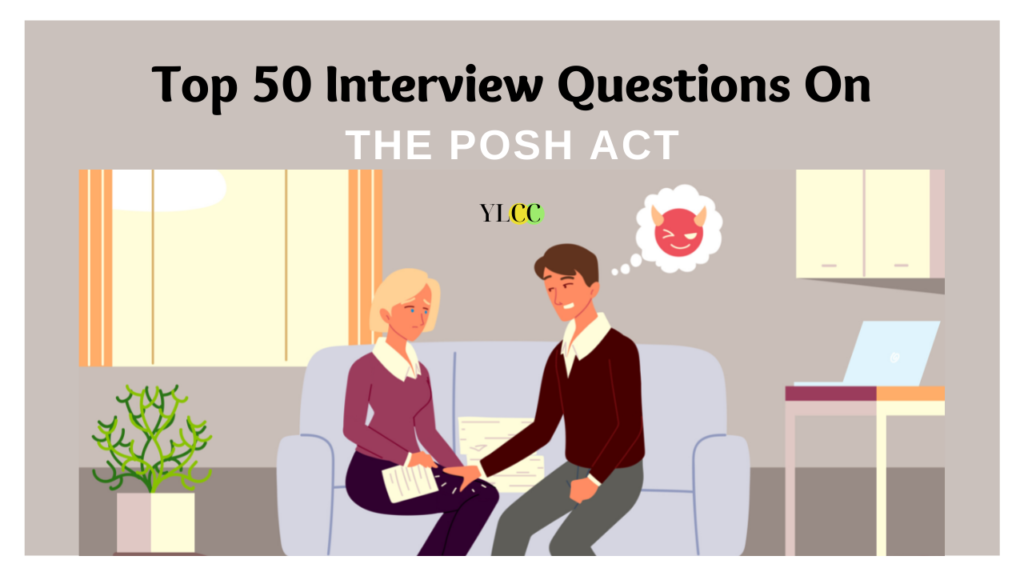
Introduction
Protection of Women from Sexual Harassment Act which is also known as POSH Act, was enacted in 2013. As per this Act sexual harassment are of three types Physical, Verbal and Visual and covers physical advances, demanding or requesting sexual favours, showing pornography, making sexually coloured remarks, sending sexually explicit messages, and any other unwelcome sexual conduct in the workplace. This Act imposes certain mandatory actions for every company having more than ten employees. It is required by the Act to form an Internal Complaints Committee (ICC) in the prescribed manner to receive and address complaints of any kind of sexual harassment from women in a timely and highly confidential manner. Noncompliance with this Act can result in a compensatory penalty of up to INR 50,000 for an employer. Before POSH Act the honourable Supreme court in a landmark judgement laid Vishakha guidelines that dealt with sexual harassment at workplace.
- What are your views on Protection of Women from Sexual Harassment awareness?
- What do you understand by Protection of Women from Sexual Harassment awareness policy?
- Is POSH training important?
- What do you understand by indirect harassment?
- According to this act who is eligible to file a sexual harassment complaint at work?
- What are the objectives of this Act and what is its full form?
- What does the term Quid Pro Quo harassment means?
- Is there any right available with respect to sexual harassment at workplace, explain with reasons?
- Does non compliance with this Act provisions carries a penalty?
- What are the Vishaka Guidelines?
- What do you understand by a non-verbal conduct?
- Is there any provision available for a man to file a complaint of sexual harassment against a woman?
- What does a workplace under this Act means?
- What does an internal committee under this Act means?
- Was any other act available before the POSH Act?
- Why is the case Vishaka vs State of Rajasthan important with respect to this Act?
- Mention few provisions available under POSH Act?
- What is a SHe-Box?
- Why was Justice JS Verma committee constituted?
- What is the importance of The UN Convention on the Elimination of All Forms of Discrimination Against Women?
- Explain the importance of this Act?
- Mention the composition of ICC?
- What are the kinds of harassment as per this Act?
- What do you understand by HR POSH?
- Which has lead to the passing of this Act?
- Mention the origin of this Act in our country?
- Explain prohibited retaliation?
- Differentiate between ICC and LCC?
- Is there any time limit to register the complaint and can it be extended?
- Mention the authorities granted to the appropriate government by this Act?
- Can the payment amount of compensation be maid by LCC or ICC? If yes then how much?
- What is the role of nodal police officer?
- Is the Local Complaints Committee’s jurisdiction limited, Explain?
- What is the process of complain to registered?
- Who is District officer and what are the powers and duties?
- What is the relevance of Prevention of Sexual Harassment Act, 2013 with respect to this Act?
- Is Sexual harassment at workplace considered if such s harassment occurs outside of working hours, explain with reasons?
- What are the main ingredients of complaint to be mentioned kept mind?
- Can the complaint be forwarded to the police by ICC?
- What actions and powers are available to ICC ?
- What are the duties of employer under this Act?
- What do you understand by monitoring mechanism?
- Is there any provision for appeal available under this Act?
- Can some other person file a complaint on behalf of the victim under this Act?
- What are the contents and mechanism of an annual report as per this Act?
- Are there any penalties imposed for non compliance with this Act?
- Can the compensation amount be recommended to the aggrieved women under POSH act? If yes, then how and who will?
- Is there any process of Conciliation and Settlement under this Act?
- What are the remedies available if the witness has given false evidence?
- Can the complaint be publicly published under this Act?
YLCC would like to thank Anam Khan for her valuable insights in this article.






